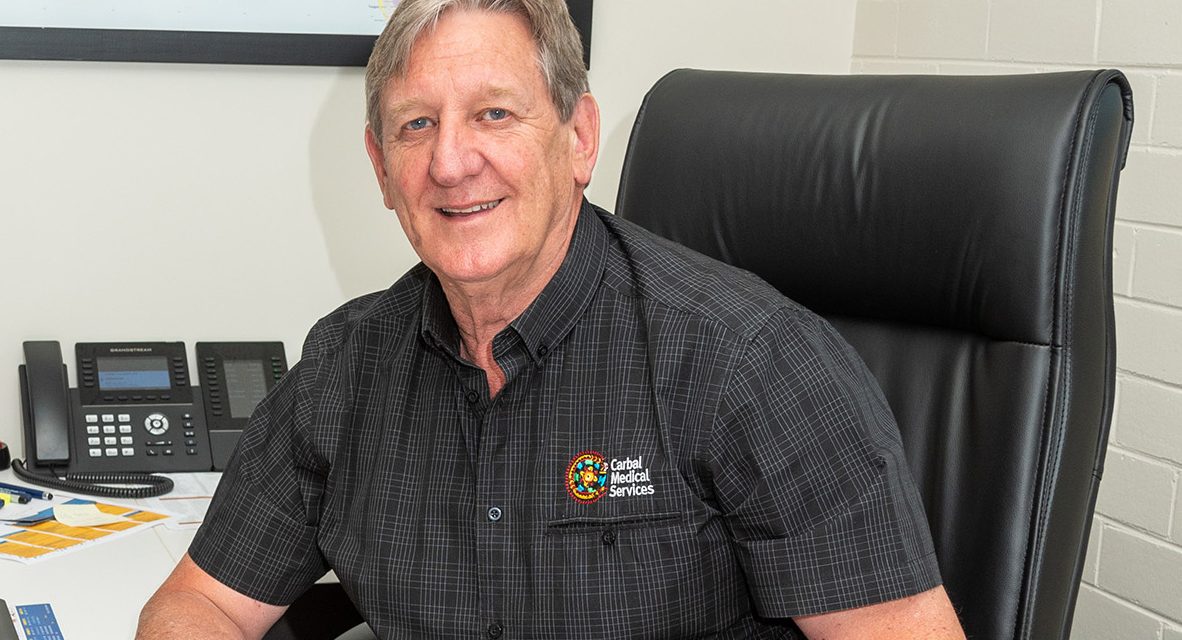When Brian Hewitt, CEO of Carbal Medical Services was appointed to the position eight-and-a-half years ago, he lamented that programs that were beneficial to the health of the community ceased as soon as funding streams discontinued.
Coming to terms with the variability of government priorities and their support for Aboriginal and Torres Strait Islander community organisations led Mr Hewitt to a conclusion:
Carbal needed to self-generate at least 50% of its funds in order to maintain autonomy to continue funding programs that were achieving positive outcomes. Self-generated resources would also increase flexibility to value-add or expand existing programs and provide for Carbal to act independently of government priorities.
Mr Hewitt said self-generating the funds was important as it meant they didn’t need to wait for governments in order to provide effective health programs for the community.
“My view is that if a program is worth doing, then it’s worth doing at any relevant time and not just when governments provide funding,” Mr Hewitt said.
“Government funding is always competitive, and there is always considerably more demand for public money than there is supply. That’s why it is important that we can self-fund priorities beyond those identified by the government of the day.”
Carbal reached their 50/50 funding goal around four years ago and has been able to use the extra funds to considerably bolster the service offerings of their core business.
One such business is Carbal Dental, which caters for Indigenous and non-Indigenous clients.

Carbal entered into a partnership with James Cook University’s dental school to employ final year dentistry students who engage in practical work in the clinic, which not only brings down staffing costs, but allows the service to charge just a $25 fee for all patients of Carbal Health Services.
The service is subsidised and made sustainable by charging full, but reduced fees for services to non-Carbal clients.
According to Brian, the ability for mob to access timely and affordable dental care has had a considerable impact on waiting lists at the Toowoomba Hospital too.
“We know a lot of health issues start with teeth,” he said.
“By helping people before they need to present at a hospital, we’re easing the burden across the whole health system.”
The dental service was established and is entirely maintained by Carbal self-generated funds – including the $1.4 M initial purchase and fit-out.
Self-generated funds have allowed Carbal Hearing to fit out two hearing test vans which visit around 50 Darling Downs schools twice annually to perform hearing tests and refer children who may need further treatment. Aboriginal and Torres Strait Islander children are treated at no cost, while a small fee for non-Indigenous children supports the entire program.

Another successful venture has been The Art of Carbal. The venture features the internationally acclaimed art of local Elder and Carbal Board Chairperson, Uncle Colin Jones who generously donated the rights to re-sell his art as prints online. Re-prints of 26 of his artworks are for sale in various sizes and types of canvas. This initiative currently generates around $100,000 in extra income per year.

Carbal has also developed a suite of online culturally appropriate education programs. During COVID-19, Carbal had to pivot to continue to provide education to business and health professionals by adapting face-to-face courses. The venture covers diverse fields from basic business skills and cultural awareness training, to a social and emotional wellbeing course, chronic disease prevention through culture courses and focussed psychological strategies.
Some of these courses are also RACGP and ACRRM accredited, meaning general practitioners can earn continuous professional development points.
The signups create income in excess of $100,000 a year.
The extra ventures mean Carbal can largely absorb administration costs of new programs and devote all government money to programs.
This made the service valuable to funding bodies as they perceive more ‘bang for their buck’. During the height of COVID-19, Carbal was selected to conduct the Community Respiratory Clinic for Toowoomba, delivering tens of thousands of vaccinations and COVID-19 tests during this time.
“Each of the programs we deliver for the Darling Downs and West Morton Primary Health Network have had extra staff allocated due to an injection of self-generated funds allowing us to absorb much of the cost of administration,” Brian said.
Perhaps the jewel in Carbal’s non-clinical crown is the success of Carbal Digs, a service which provides accommodation in serviced apartments for mob travelling to Toowoomba for medical care under the Patient Travel Subsidy Scheme or Isolated Patients Travel and Accommodation Assistance Scheme.
This initiative allows Carbal to offer the accommodation at no charge to the clients, depending on the approval level of the schemes.
Carbal now owns thirteen two-bedroom within this program. Each unit can sleep up to four individuals, meaning families need not be separated when travelling for medical care. Each unit is fitted out similarly to a hotel room and features: one bedroom with a queen size bed with linen, one bedroom with two single beds with linen, fully equipped kitchenets/kitchens, a flat-screen TV, free Wi-Fi, assisted disability bars in toilets and bathrooms, a fully fenced back yard and private parking for one car per unit.
Carbal has built on its success to be in a position where all properties, vehicles and equipment have been fully purchased without any funding input from governments or any loans of any kind.
“Carbal has been able to think outside the square when it comes to making our operations sustainable and largely self-determined and our service community has benefitted enormously from the initiatives and the approach adopted”.










